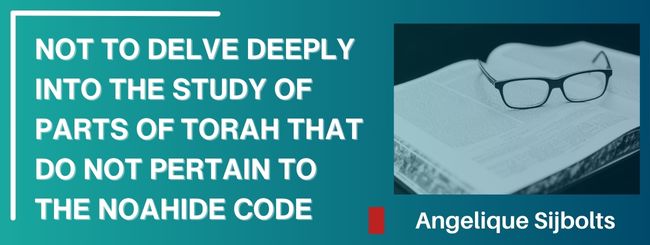בס”ד
FUNDAMENTALS OF THE FAITH – 11 NOT TO DELVE DEEPLY INTO THE STUDY OF PARTS OF TORAH THAT DO NOT PERTAIN TO THE NOAHIDE CODE.1
There is often confusion among non-Jews regarding what they may or may not read and study from the Torah. The notion that non-Jews cannot read parts of the Torah that do not directly pertain to the Noahide Code arises from a misunderstanding of the term “delve deeply.” Let us clarify this misunderstanding and explain which parts of the Torah non-Jews may read and study, and what is meant by “delve deeply.”
Non-Jews May Read the Entire Torah
Non-Jews are permitted to read all 24 books of the Tanach (the Hebrew Bible, including the Torah, Prophets, and Writings). This also includes commentaries that explain the straightforward meaning of the text, such as those by renowned commentators Rashi, Sforno, and Ibn Ezra, to correctly understand the verses.
We learn this from Rambam (Maimonides) in Laws of the Torah Scroll 10:8, where he states:
“A gentile may hold a Torah scroll and read from it.”
This demonstrates that there is no prohibition on reading the texts themselves, as long as the focus is on understanding their Peshat, the simple, literal meaning. Peshat refers to the straightforward interpretation of a text, without delving into mystical explanations. However, if commentators like Rashi use Midrashic elements to clarify a verse, non-Jews should focus on the main point that the commentator is conveying.
What Does “Delve Deeply” Mean?
The term “delve deeply” refers to in-depth study of the Torah for the sake of acquiring profound Torah knowledge. The Divine Code (by Rabbi Moshe Weiner)2 defines this as follows:
“This is learning only for the sake of acquiring Torah knowledge itself. This means deep involvement in the study, and penetrating, investigative learning. This includes learning to deeply understand the detailed Torah laws, the deeper reasons of the commandments, or the depth of the intention of words of Scripture and Talmud, and not for any other goal.”
It is crucial to understand that this form of in-depth study is intended for the Jewish people, who received the Torah as their inheritance from G-d. Rambam (Laws of Kings 10:9) clarifies:
“They may not delve into anything other than their… Noahide Commandments.”
However, it is also clear from Rambam that non-Jews must deeply study the Noahide Code to properly fulfill their obligations. As he states in Rambam, Laws of Kings 10:1:
“A non-Jew who mistakenly sinned because he did not learn is liable.”
This shows that non-Jews have a responsibility to fully understand their commandments. Within the broad scope of the Noahide Code, a pious Gentile may (and should) engage in penetrating3 investigative learning, including exploring the intricate details and reasoning behind these commandments.4
The Distinction: What May Non-Jews Study in Depth?
The distinction lies in the Noahide Code, the seven commandments that obligate non-Jews to follow universal moral laws. Non-Jews are required to fully understand these commandments and may delve deeply into their study. This includes exploring logical obligations such as giving charity or honoring parents.
However, they may not delve deeply into parts of the Torah that pertain to the 613 mitzvot, which are exclusively binding upon the Jewish people.
Why Is This Distinction Important?
The Torah is given by G-d to the Jewish people as their heritage, as stated in Deuteronomy 33:4:
| 4 Moses commanded us a law, an inheritance of the congregation of Jacob. | ד תּוֹרָה צִוָּה-לָנוּ, מֹשֶׁה: מוֹרָשָׁה, קְהִלַּת יַעֲקֹב. |
“The Torah that Moses commanded us is the inheritance of the congregation of Jacob.”
The Jewish people are tasked with understanding the deeper meanings and mystical dimensions of the Torah. Non-Jews, on the other hand, have the responsibility to follow the Noahide Code, which guides their ethical and spiritual obligations. By focusing on what is relevant to their role, non-Jews maintain clarity and respect the sanctity of the Torah as the Jewish heritage.
Conclusion
Non-Jews may read the entire Tanach as long as their focus is on the literal meaning of the text. They may not delve into mystical or profound aspects that are intended exclusively for the Jewish people. It is essential for non-Jews to fully understand the Noahide Code and delve deeply into its study while refraining from engaging with the intricate Jewish laws that do not pertain to them.
It is important to note that Jews have a specific commandment to study Torah for its own sake, not merely to acquire practical knowledge of the commandments. This is considered their “inheritance” and a spiritual obligation. Non-Jews do not have such a commandment.
This approach ensures that non-Jews develop a clear and practical understanding of their spiritual responsibilities while respecting the unique relationship between the Jewish people and the Torah. By maintaining this distinction, each group can fulfill their respective roles and obligations in a way that aligns with their unique relationship to the divine teachings.
By Angelique Sijbolts
With thanks to Rabbi Tani Burton for his feedback
Sources:
- The Divine Code by Rabbi Moshe Weiner, 4 edition Part 1 p 33. ↩︎
- The Divine Code by Rabbi Moshe Weiner, 4 edition Part 1 p 75. ↩︎
- The Divine Code by Rabbi Moshe Weiner, 4 edition Part 1 p 71, footnote 87. ↩︎
- The Divine Code by Rabbi Moshe Weiner, 4 edition Part 1 p 72. ↩︎
© Copyright, all rights reserved. If you enjoyed this article, we encourage you to distribute it further.
Our blogs may contain text/quotes/references/links that include copyright material of Mechon-Mamre.org, Aish.com, Sefaria.org, Chabad.org, and/or AskNoah.org, which we use in accordance with their policies.
